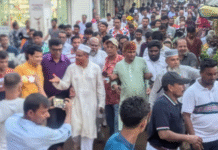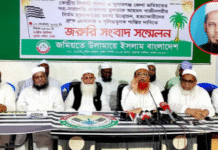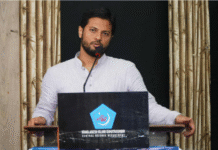
BNP secretary general Mirza Fakhrul Islam Alamgir has promised that their party will remain cautious not to nominate any loan defaulter in the upcoming national election.
“We’re committed to people that we’ll surely try to ensure that defaulters do not get nominations. We’ll be very careful in this regard,” he said during a symposium titled “White Paper and Thereafter: Economic Management, Reforms and National Budget” at the Bangabandhu International Conference Centre (BICC) in the capital on Saturday.
Fakhrul made the remark in response to a question from noted economist Prof Rehman Sobhan, who asked whether the BNP would support the proposition that loan defaulters should be barred from contesting elections to curb the influence of money and muscle power.
He said their party is working on a future course of action to move the country forward, taking lessons from past experiences.
The BNP leader, however, acknowledged that it may not be possible to change everything overnight.
He stressed the need for properly rebuilding the country’s institutions. “Our democratic institutions were destroyed over the past 15 years during the Awami League government. We believe in institutional settlement.
What we need most now is to fix the institutions. Enough is enough. Let’s truly build Bangladesh as per our dreams and the desires of the people.”
In reply to a question about whether their party wants the fascist political party Awami League to participate in the election, Fakhrul said it is the people of the country who will decide on this matter. “As a political party, we’re not willing to make a decision on it.”
Asked why BNP is insisting on an interim government to hold the national election promptly, Fakhrul said they believe only an elected government can properly resolve the country’s problems. “Since the elected government comes to power with the public mandate, they have the authority to address the people’s issues.”
He said the interim government should arrange the election as soon as possible to establish an elected government as such an administration can implement all types of reforms through discussions in parliament.
Fakhrul said BNP presented a comprehensive 31-point political and economic reform outline two years ago.
He said BNP prioritises political reforms, including limiting the prime minister to two terms, establishing a bicameral parliament, and ensuring that those who do not contest elections can still participate in governance.
Fakhrul reiterated BNP’s proposal for the formation of a national government after the election as the party wants to eliminate inequalities and take the country forward based on national unity.
In response to a question about whether BNP will be able to implement reforms if it comes to power, Fakhrul said it is incorrect to say that BNP will not be able to do so since the party committed to carrying out reforms as per their 31-point proposal.
He said many people hope an interim government will resolve all issues within six months, but he described this as unrealistic.
“That is why we are focusing more on the election. Democracy was not practiced in our previous parliaments. Let’s try and see if we can,” the BNP said.
When asked about the Rohingya issue, Fakhrul said the Awami League had not taken proper steps to resolve the crisis, including holding talks with China and India, as it was not a priority for them.
He said if BNP returns to power, they will make their best efforts to find a suitable solution to the Rohingya crisis, just as they did in the past.
prothom alo









